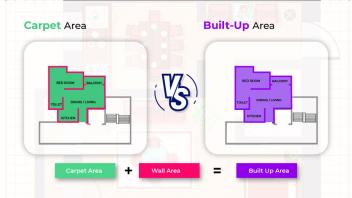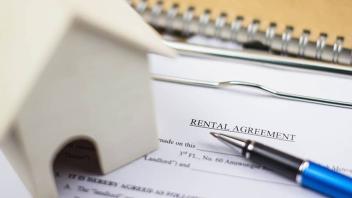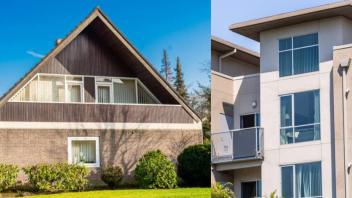What is Security Deposit & All You Need to Know about Security Deposit Refunds

Security deposit is the cornerstone of the Indian rental market. It's not just a transactional amount that is exchanged between the tenant and landlord, but a symbol of trust, assurance and a legally binding protection.
On one hand, security deposits act as a financial safety net for landlords. It assures them that their property will be well-maintained, and if any unprecedented damages occur, they will not have to bear the brunt of the financial implications.
On the other hand, it is a sign of commitment for tenants to the place they call 'home', even if it just temporary. Tenants can get their deposit back upon adhering to the terms of the rent agreement and leaving the property in its original condition at the time of vacating.
This dual role of a security deposit makes sure that both parties can proceed with a level of comfort and certainty in their rental journey. Whether you're a homeowner renting out your space, or a tenant looking for a rental unit, understanding the nuances of the security deposit is crucial.
Table of Contents
- What is a Security Deposit?
- What does Model Tenancy Act 2021 say about Security Deposits?
- Trends of Security Deposit Amount Collected in Top Cities
- Tips for Tenants to Get Back the Security Deposit Money
- What Landlords Need to Know about Security Deposits
- Drafting a Security Deposit Agreement and Refund Clauses & Conditions
- How to Handle Disputes Over Security Deposits
- Frequently Asked Questions about Security Deposits
What is a Security Deposit?
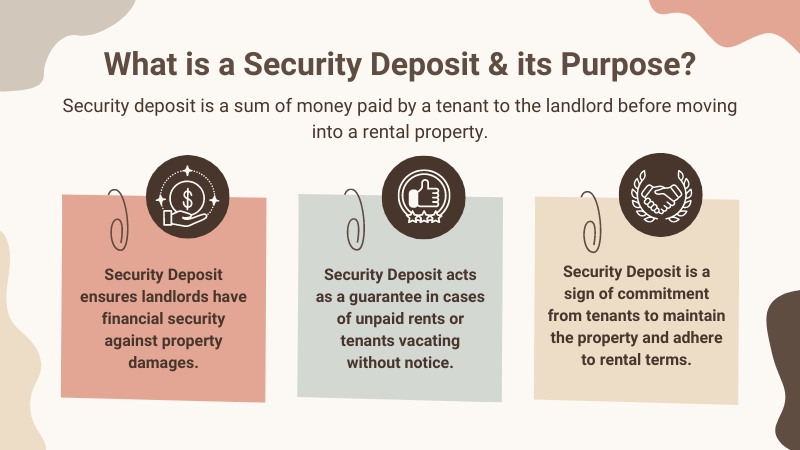
Security deposit is a sum of money paid upfront by a tenant to the landlord before moving into a rental property. It acts as a financial assurance for the safety of the rented property and is held by the landlord for the duration of the tenancy.
The security deposit amount is typically returned to the tenant at the end of the lease period, excluding any deductions for damages made to the property or unpaid rental amount. The specifics of how much security money is to be paid, when it should be paid, and the conditions under which deductions can be made before returning it, are usually laid out in the lease or rent agreement.
Also Read: Questions to Ask Your Landlord before Renting a Home
Purpose of Security Deposits
The collection of security deposit has some fundamental reasons behind it:
-
Protection Against Damages: One of the primary reasons most landlords take a security deposit is to ensure they have a financial cushion in case the tenant causes any unintentional or deliberate damages to the property that might be beyond regular maintenance.
-
Ensuring Payment of Rent: A security deposit also acts as a guarantee for landlords that the monthly rent will be paid on time. In cases where the tenant might default or is the tenant vacates without notice, the deposit can be utilized to cover the unpaid rent.
-
Commitment from Tenants: From the tenant's perspective, a one time payment of security deposit also signals a commitment to maintaining the residential property, adhere to the terms of the rental agreement, ensuring the landlord will return the security deposit in full at the end of their tenancy.
What does Model Tenancy Act 2021 say about Security Deposits?
The Model Tenancy Act 2021 was introduced by the Indian government to reconstruct the outdated rental laws in the country and bring about a standardized and more balanced approach to tenancy. This act aims to protect the rights of both landlords and tenants, making the rental ecosystem more transparent and efficient.
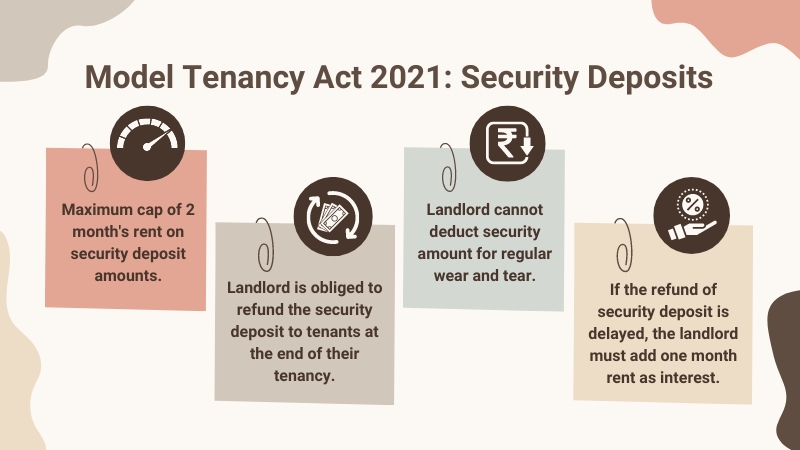
When it comes to security deposits, the Model Tenancy Act 2021 has brought significant clarity:
-
Cap on Security Deposit: For residential premises, the maximum cap on the security deposit amount is two month's rent, and for any non-residential property, the deposit amount is capped at six months rent. However, the security deposit amount for commercial properties is generally based on mutual agreement between the tenant and landlord.
-
Refund of Security Deposit: At the end of the tenancy, the landlord is obliged to return the security deposit to the tenant. If there are any deductions, they should be clearly explained and supported with appropriate evidence like bills and receipts.
-
Protection for Tenants: The landlord cannot deduct the security deposit amount for regular wear and tear of the property when the tenant vacates the rental unit. Only significant damages or breaches of the rental agreement can warrant deductions.
-
Timely Payment: In the event of any delay in refunding the security deposit after termination of the lease, the landlord might have to pay a monthly rent as interest on the due amount.
Also Read: Is it better to rent or buy a home?
Trends of Security Deposit Amount Collected in Top Cities
Ever since the Model Tenancy Act was approved in June 2021, only 4 states have adopted it and revised their tenancy state laws accordingly, namely, Andhra Pradesh, Tamil Nadu, Uttar Pradesh, and Assam. The individual state laws dictate most of the norms and practices surrounding security deposits, especially in major metropolitan cities.
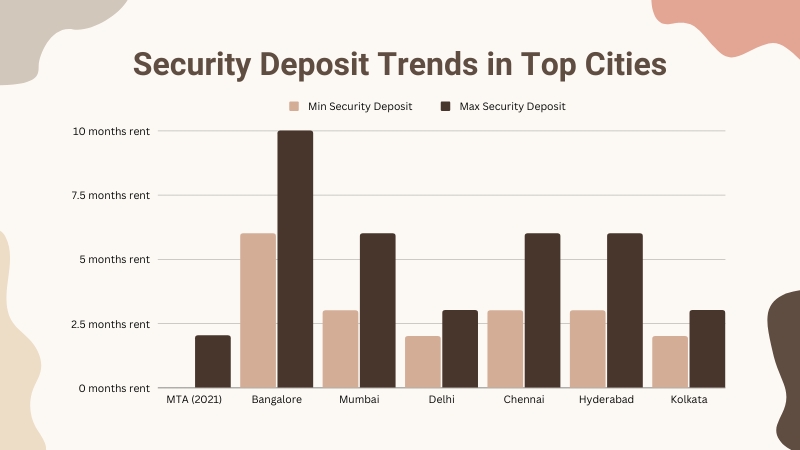
-
Bangalore: The norm of collecting security deposits in Bangalore has always been quite high, with landlords demand a security deposit equivalent to 6 to 10 month's rent. Tenants have always had troubles with this trend, especially since the monthly rental amount is usually pretty high.
-
Mumbai: In Mumbai, the security deposit amounts tend to range from 3 to 6 month's rent. Given the city’s expensive real estate, the security money can be quite huge in absolute terms.
-
Delhi: The national capital sees a more moderate approach, almost in line with the MTA, where landlords typically ask for a security deposit equivalent to 2 to 3 month's rent.
-
Chennai & Hyderabad: In these southern cities, the deposit can range from 3 to 6 month's rent, depending on the locality and the specific terms set by the landlord.
-
Kolkata: Here, people tend to be more cautious, and landlords are usually happy is the renter pays a security deposit of about 2 to 3 month's rent.
It's important to note that while the MTA 2021 lays down a structured framework, the actual practices in different cities can still vary. Tenants and landlords should always refer to the specific rent control rules of their state and mutually agree upon terms that are common between both the Model Tenancy Law and the prevailing trends of their city.
Also Read: Rental Laws for Tenants and Landlords
Tips for Tenants to Get Back the Security Deposit Money
Navigating the rental market can be a daunting experience, especially when a substantial amount of money is involved, like the security deposit. However, with a few strategic steps, tenants can ensure they are well-positioned to claim the security deposit back in full when they move out.
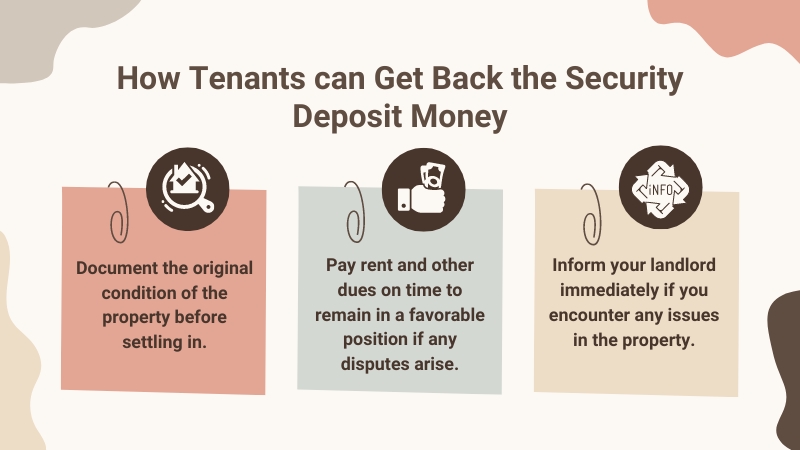
Here are some essential tips every tenant should consider:
#1 Document the Condition of the Property at the Time of Move-in
Before settling in, take a day to meticulously check and document the condition of your new rented space, by taking photos and videos of every room, focusing on existing damages, natural use-related wear, or any other peculiarities.
Document the minor cracks, peeling paint, damaged fixtures, external electrical wiring, and even condition of appliances if they are part of the rental agreement. Store these files securely, preferably with timestamps and keep a backup on cloud storage. This visual documentation will help as evidence, ensuring there's no room for disagreements regarding the deductions in security deposit when you decide to move out.
#2 Ensure Prompt Payment of Rent and Other Dues
Make sure to keep paying rent and other associated dues, like maintenance or utility bills, on time. This simple action will be a testament to your credibility as a tenant. Set reminders or automate payments if necessary, as this helps builds trust with your landlord and puts you in a favorable position if any disputes arise concerning the security deposit.
#3 Communicate Regularly with the Landlord about Property Issues
If you encounter any issues in the property, such as a leaky faucet, electrical problems, or structural damages, inform your landlord immediately. Don't wait for problems to escalate. By keeping the landlord in the loop, you're showing responsibility and proactiveness, ensuring that any property issues are mutually understood and resolved. This reduces the chances of misunderstandings or disagreements later when the time comes to refund the security deposit.
Remember, the security deposit is a reflection of trust and commitment between a tenant and a landlord. By following these steps, tenants can foster a smooth rental experience and ensure they're well-prepared to claim their full deposit back at the end of their lease period.
What Landlords Need to Know about Security Deposits
Security deposit acts as insurance against potential breaches or damages to the property. However, as a property owner, managing this crucial aspect involves more than just collecting money at the start. It's about fostering trust, ensuring transparency, and taking proactive measures to minimize conflicts.
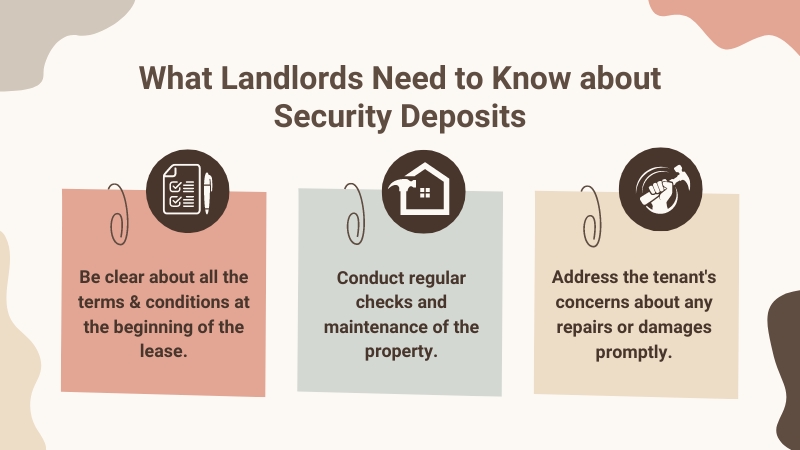
Here are some pivotal strategies landlords can adopt to manage security deposits seamlessly:
#1 Be Clear about the Terms at the Beginning of the Lease
When drafting the lease agreement, ensure that all terms related to the security deposit are explicitly stated, including the exact amount, reasons for potential deductions, timeline for returning the deposit after the lease expires, and the method of documenting the property conditions at the time of vacating.
Both parties should thoroughly review and understand these terms as ambiguity can be a breeding ground for disputes; the more specific you are, the fewer disagreements you're likely to face.
#2 Conduct Regular Property Maintenance
As a landlord, maintaining the structural integrity and functionality of your property isn't just beneficial for its long-term value but also instrumental in curbing disagreements over damages.
By ensuring regular checks, repairs, and upkeep, you reduce the chances of large-scale damages or issues that might later become points of contention when determining deposit deductions. Make sure to address common maintenance related issues like kitchen fixture repairs, socket repairs, structural repairs, drain cleaning, etc.
#3 Address the Tenant's Concerns Promptly
If your tenant reaches out with concerns about any repairs, damages, or changes in the property, address them with urgency and understanding. Prompt responses not only build trust but also ensure that small issues don't escalate into major problems, and it can be beneficial if any disputes arise about the security deposit.
Note: It's recommended that landlords keep security deposits in a separate bank account to avoid any mix-up with personal funds. Though not a mandatory practice in India, this segregation helps in smooth transactions when the time comes to refund the deposit.
By adhering to these tips, landlords can ensure the process of managing security deposits is hassle-free for both parties.
Drafting a Security Deposit Agreement and Refund Clauses & Conditions
The agreement is the most important part of the security deposit.; it is a written document that sets the expectations and terms between tenant and landlord. This document often becomes the point of reference in case of any disputes regarding the security money.
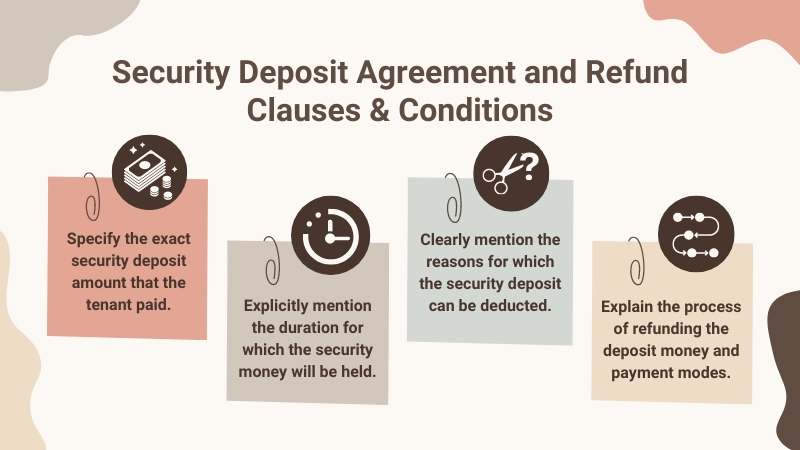
Here's a breakdown of what a well-structured security deposit agreement should contain:
Clause 1: Specify the Exact Security Deposit Amount Paid
The agreement should clearly specify the exact amount of the security deposit paid by the tenant, to avoid any ambiguity or misinterpretation later. The initial payment should be acknowledged with a receipt, and preferably mention these details in the agreement.
Clause 2: Mention the Duration of Holding Security Deposit
Define the time period for which the security deposit will be held. Typically, it's for the length of the lease, but it's crucial to state this explicitly.
Clause 3: Conditions for Deducting the Security Deposit
Clearly mention the reasons for which the security amount can be deducted. This can include significant damages or breakages beyond normal depreciation over time due to regular use, non-payment of rent or utility bills, or any other breaches of the lease agreement.
Note: Any communication related to property conditions, alterations, disputes, or modifications to the initial agreement should be documented. Emails, letters, or even text messages can serve as a record of mutual understandings or disagreements.
Clause 4: Process & Timeline of Returning the Security Deposit
The agreement should explain the process of returning the complete or remaining deposit amount once the tenancy ends, including any necessary inspections, timelines, and methods of payment. This prevents unnecessary delays and fosters trust between both parties.
A well-drafted security deposit agreement is the foundation of the landlord-tenant relationship. Both the tenant and the landlord should retain a signed copy of the security deposit agreement. This acts as evidence of mutual consent to the terms and can be referenced in case of disputes.
How to Handle Disputes Over Security Deposits
Even though security deposits are an important part of renting, they can sometimes be a source of conflict between owners and renters. Understanding the nature of these disagreements and how to deal with them can help with easier resolutions.
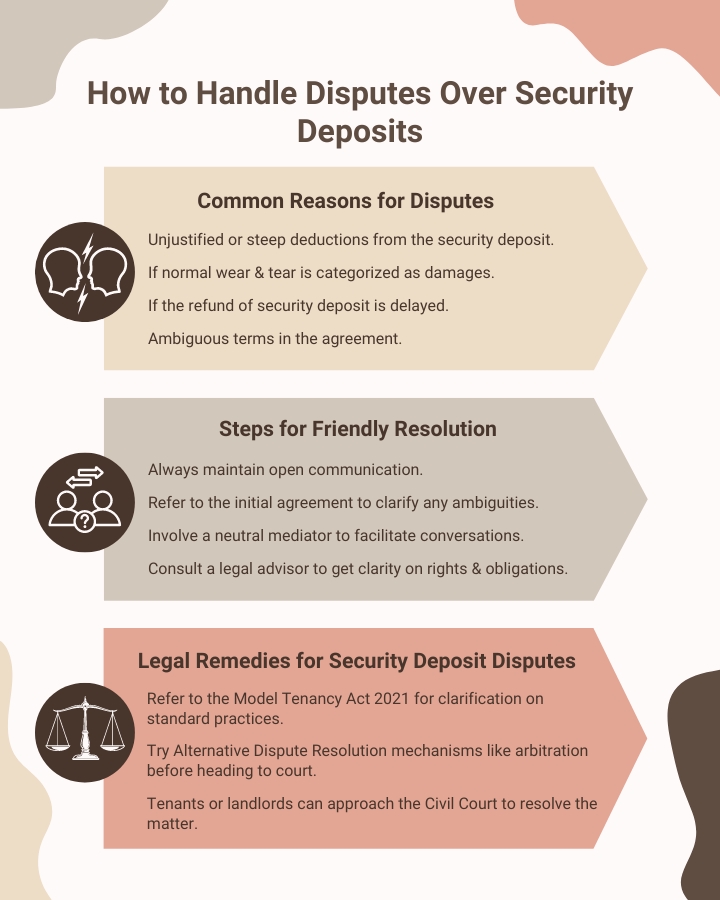
-
Common Reasons for Security Deposit Disputes:
-
Deductions from Deposit: Often, disagreements arise over the amount deducted from the deposit, especially if the tenant feels the reasons are unjustified or deductions are too steep.
-
Wear and Tear vs. Damages: A significant point of contention can arise when landlords categorize normal wear and tear as damages, leading to deductions.
-
Delay in Refund: Tenants may become restless if there are unnecessary delays in returning the security deposit post the termination of the lease.
-
Unspecified Terms: Ambiguous terms in the rental agreement about the security deposit can lead to misinterpretations and hence disagreements.
-
-
Steps for Friendly Resolution:
-
Open Communication: Before escalating matters, the first step should always be for the tenant and landlord to have an open communication and resolve issues through mutual understanding.
-
Refer to the Agreement: Referring the initial rent and security deposit agreement can clarify any ambiguities. Both parties should always maintain a signed copy of the agreement this this reason.
-
Use a Mediator: Involving a neutral third party or a mediator can help provide an objective point of view and facilitate a conversation between the tenant and landlord.
-
Seek Counsel: Sometimes, it might be beneficial for tenants and landlords to consult with a legal advisor or expert in rental laws to get clarity on your rights and obligations.
-
-
Legal Remedies for Disputes:
-
Model Tenancy Act (MTA) 2021: This act provides guidelines on the handling the security deposit. Both parties can refer to it for clarification on standardized practices. If either side thinks the other has broken the rules of the MTA, they may be able to get justice in court.
-
Alternative Dispute Resolution (ADR): Many rental agreements now include clauses that mandate resolving issues through ADR mechanisms like arbitration before heading to court.
-
Civil Court: If disputes cannot be resolved amicably or through mediation, tenants or landlords can approach a civil court to resolve the matter.
-
Handling disputes requires patience, understanding, and a willingness to reach a mutual agreement. While harmonious solutions are always preferable, it's essential to know that there are structured legal avenues available to ensure both parties' rights are upheld.
FAQs about Security Deposits
What is security deposit money?
A security deposit is a sum of money paid by a tenant to a landlord at the start of a lease. It serves as collateral for any potential breaches of the lease terms, damages to the property, or unpaid rent amount. The amount is typically held by the landlord for the duration of the lease.
What is the purpose of security deposit?
The primary purpose of a refundable security deposit is to ensure that the tenant abides by the terms of the lease. It also acts as a financial safeguard for landlords against potential property damages or rent arrears. At the end of the lease, if no breaches have occurred, the complete security deposit or balance amount after deductions is refunded to the tenant.
How is a security deposit calculated?
The amount of a security deposit varies and is typically defined in the rental agreement. In India, it's common for landlords to ask for an amount ranging between 3-10 months' rent, depending on the city and the property's actual location.
When should my security deposit be returned?
The security deposit should be returned upon termination of the lease, after deducting any outstanding amounts due to damages, unpaid rent amount, or other lease breaches. The specific timeline can be specified in the lease agreement.
What if my landlord is not returning my security deposit?
If a landlord unjustly withholds a security deposit, the tenant can initially try resolving it on friendly terms. If that doesn't resolve the issue, they can refer to the rent agreement's terms, seek mediation, or even pursue legal methods.
Can I get my deposit back if I have not signed an agreement?
While written agreements provide legal protection, verbal agreements can also be binding. If no contract was signed, evidence of payment (like bank transfers or receipts) or any other written communication, like emails or messages, can support your claim. However, having a written and signed agreement is always advisable.
Can security deposit be adjusted against rent?
Generally, security deposits shouldn't be adjusted against rent unless both parties explicitly agree to such an arrangement. It's essential to have this agreement in writing to prevent future disputes.
How do I prove I have not violated any terms of the deposit refund?
Keep records of rent payments, property inspection reports, any repairs done, and maintain a log of all communications with the landlord. Photographic or video evidence of the property's initial condition before moving in can also be beneficial.
How can a tenant ensure a full security deposit refund?
To ensure a full refund:
-
Always pay rent on time.
-
Abide by all terms of the lease.
-
Document the property's condition at the start and end of the lease.
-
Maintain the property's condition and promptly report any damages.
In which situation can the landlord keep the security deposit?
A landlord may retain all or part of the security deposit if:
-
There's unpaid rent.
-
The property has suffered damages beyond normal use.
-
The tenant breaches any terms of the rent agreement.
-
There are unpaid bills or dues at the end of the lease period.
Security deposits play a pivotal role in the rental industry. For homeowners, it provides a safety net against potential damages, rents not paid, or contractual breaches, while for renters, it represents their sincere intent to uphold their end of the rental agreement. Understanding the nuances of security deposits of rental housing is not just recommended but vital for both parties involved.
However, beyond the financial and legal aspects of security deposits, lies the essence of mutual trust and understanding. It's important to remember that at the heart of every rental agreement is a connection between the landlord and the tenant. Most disagreements can be avoided before they start if people talk to each other clearly and try to understand each other's problems.
A successful landlord-tenant relationship isn't built on lease agreements alone but on a foundation of mutual respect and understanding. To navigate the journey of monthly rentals and the substantial sum of security deposit smoothly, both parties should make an effort to be clear about their expectations, rights, and responsibilities.



